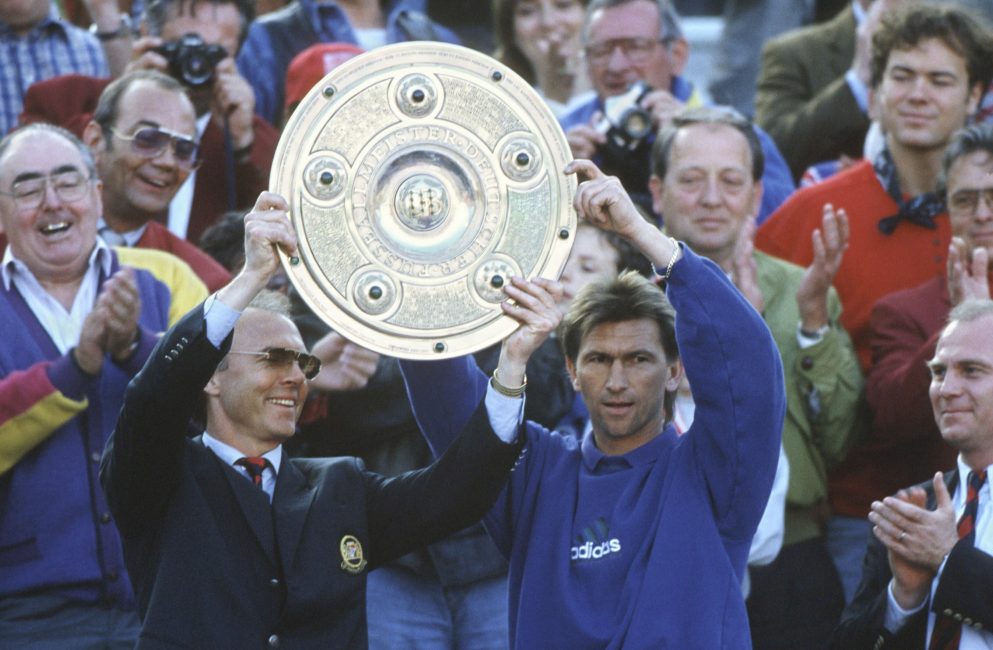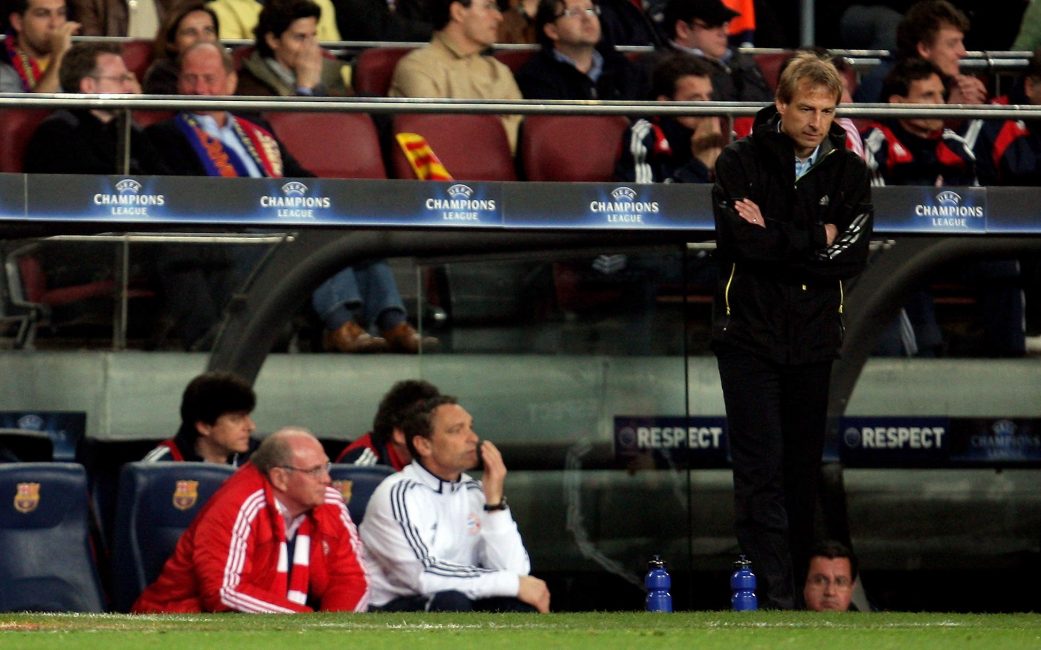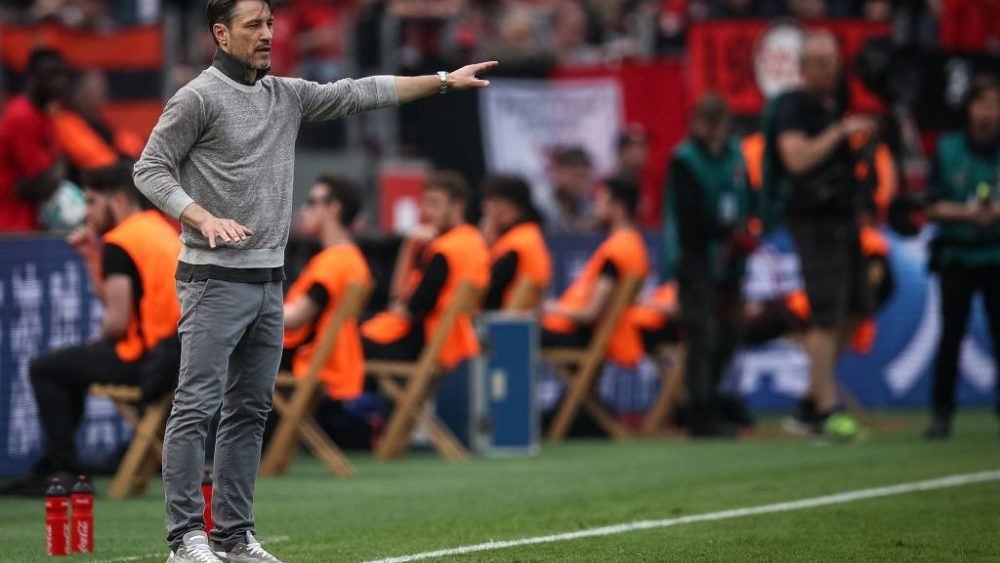Stats & Links: Kovac, the Fifth
Together with his brother Robert Kovac, Niko Kovac moved to the Isar in summer 2001. For the new season, the two brothers are now returning to Germany’s football capital on the sideline. All in all, Kovac is the fifth former Munich player in the Bundesliga era to serve as a trainer later in his career. In today’s Stats & Links we want to look at his predecessors.
Lerby, the unprepared
From 1983 on, Sören Lerby played in the midfield of the Reds. The Danish international had been wooed by Hoeneß for years and convinced the Munich-based team in his three seasons of play after initial difficulties. Lerby scored 22 goals in 89 Bundesliga matches.
When the 1991/92 season got off to a weak start with coach Jupp Heynckes and the team also dropped out of the DFB Pokal against Homburg, Hoeneß recalled his former Midfield leader and brought Lerby, who had only two years earlier ended his career in Eindhoven and had no experience as a coach, to FC Bayern.
Hoeneß hoped that the former leader would be able to show this pile of chickens a clear path and implement a necessary structure. Out of solidarity with the manager and FC Bayern, the Dane agreed, but should soon regret this decision.
Lerby was chronically overwhelmed on the sidelines. The new coach couldn’t even hold out until the end of the season. His term of office included an embarrassing 6-2 defeat to Bröndby Copenhagen and high collapses to Kaiserslautern and Dortmund.
After only 155 days the Lerby experiment was finished. The Dane could only claim four victories out of 15 Bundesliga games. Erich Ribbeck took over for the rest of the season, but even the later national coach could not lead Bayern to qualify for the European Cup.
Lerby scored an average of 1.2 points per game in his 15 games.
Beckenbauer, the World Cup winning coach
All the things Franz Beckenbauer had already achieved. As a player the Kaiser had immortalised himself as the Libero of FC Bayern and the German national team and then in 1990 he also managed to bring the World Cup to Germany as DFB team boss.
The self-proclaimed Lichtgestalt of German football took pity on two occasions and took over the coaching office of the Munich team in times of need. Both times the Munich team should end the season with a title.
In December 1993 Ribbeck had had enough and resigned. Again and again the experienced Bundesliga coach was criticized for his mediocre results with the Munich team.
Beckenbauer took over the second-placed FC Bayern and managed to turn the team around. From the time he took office, there was peace and discipline on Säbener Straße. The World Champion coach also brought a certain glamour to Munich. After all, not everyone could show a Beckenbauer as a coach. And although the Kaiser didn’t bring any tactical revolution, it was enough to win the championship – the first after four years.

(Image: Beate Mueller/Bongarts/Getty Images)
Beckenbauer took over as president of FC Bayern München e.V. and hired Trapattoni as coach for the following season.
After Trapattoni only had two seasons in Munich, Beckenbauer himself signed the “best and most successful coach of the republic” with Otto Rehhagel, who had previously become champion and cup winner with Bremen. However, King Otto never really bonded with the team and so, after a defeat in Rostock in April, Kaiser Franz had to take over again.
In only four remaining Bundesliga games under the interim coach there was only one victory. However, Beckenbauer himself baptized the UEFA Cup, the losers’ cup, and won both finals. The meticulous planner and preparer Beckenbauer had once again brought a tiel to the Isar.
After two terms in office, 18 Bundesliga games and an average of 1.83 points per game, Beckenbauer retired from the coaching business.
Klinsmann, the experiment
January 11, 2008 shocked the German media landscape. Jürgen Klinsmann, initiator of the 2006 Sommermärchen, was presented to the public in Munich as the successor of the successful trainer Ottmar Hitzfeld. A message that surprised many and caused a media response all the way to the Chancellor Mrs. Merkel.
Although Klinsmann was the team’s top scorer in both of his seasons in Munich and even set a record of 15 goals in the 1996 UEFA Cup, the Swabian had never been a Bavarian legend. Klinsmann was even seen very critically by the fans after his engagement, as he had driven the crowd favourite Oliver Kahn out of goal before the 2006 World Cup.
Nevertheless, Rummenigge saw in Klinsmann the chance to bring a breath of the Sommermärchen to Säbener Straße. Bayern should swim on a nationwide wave of sympathy with the popular head coach. The former national coach in Lahm, Schweinsteiger and Podolski also had three of his main players of the summer of 2006 at his side.

(Image: Lars Baron/Bongarts/Getty Images)
Klinsmann was one of the biggest experiments and at the same time one of the most interesting phases in the club’s history. The Swabian, who had no previous experience as club coach, turned the entire club upside down as far as his powers let him. A new training center was to be built, players were to spend more time on the campus and with Chief Physician Müller-Wohlfahrt he also fell out. Not to mention the legendary Buddha figures.
When the sporting success failed to materialize, the team went down 4-0 to Barcelona and was embarrassed by Wolfsburg with 5-1 in the league, the club called it a day. After 16 wins in 29 matches, the minimum goal of qualifying for the Champions League was in acute danger and Jupp Heynckes stepped in as coach at short notice.
Despite his early release, Klinsmann managed an average of 1.86 points per game.
Sagnol, the coach for a day
Willy Sagnol was the last ex-player to lead a Bayern Bundesliga game this season. In the summer of 2017, the former god of the cross was assigned to Italian star coach Carlo Ancelotti as overseer. Sagnol won the 2001 Champions League as a player and thus fit in well with the Hoeness renaissance phase.
However, Ancelotti and FC Bayern should not go uphill with co-trainer Sagnol either. After a beating in Paris, the Italian was dismissed and on the next matchday Sagnol, who had previously trained Bordeaux, was to put the Munich-based team back on the road to success.
After a 2-0 lead by Hummels and Lewandowski, however, the Reds frivolously missed victory in the capital and the Frenchman had to pack his bags after just one game. Once again Jupp Heynckes took over at short notice. The fact that the contract with Sagnol was more or less terminated in private after the return of Jupp speaks volumes.
This article was written in collaboration with Tobias Günther.
Links of the week
Bayern Munich taught harsh European lesson as Real Madrid punish wayward finishing | Raphael Honigstein | ESPN FC
Best out-of-contract players: Reina at the top | CIES Football Observatory
A statistical history of the World Cup’s Golden Boot award | Karan Tejwani | These Football Times
Strong Bayern don’t give Bayer a chance | Spielverlagerung
Loyal players: Buffon tops the list | CIES Football Observatory
Young Player Challenge – March 2018 Update | Goalimpact
We’re All Just Human | Tim Sparv
Bayern Munich continue to rule Germany as Bundesliga’s brain drain stifles progress | Raphael Honigstein | ESPN FC
Current MiaSanRot articles
FC Bayern München – Real Madrid 1:2 (1:1) | Justin | Sam
Three Things We Noticed: Hanover 96 – FC Bayern 0:3 (0:0) | Christopher | Dennis
Current statistics and visualizations
You are currently viewing a placeholder content from X. To access the actual content, click the button below. Please note that doing so will share data with third-party providers.









